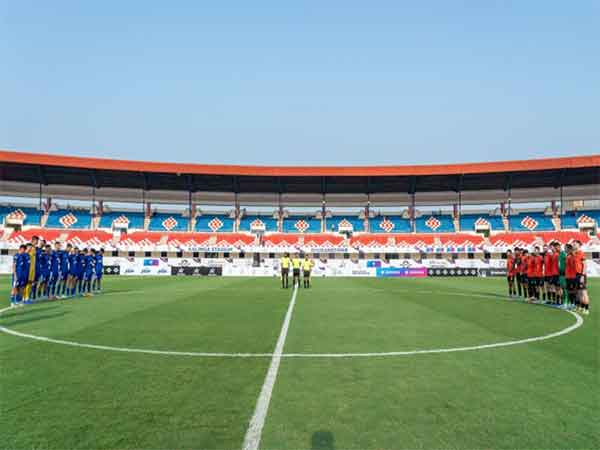WomenLift Health, DIWAS, and ETI host a webinar on charting the pathway: Accelerating women in science and medicine
Apr 14, 2023

New Delhi [India], April 14 (ANI/BusinessWire India): WomenLift Health, an organization that aims to accelerate the advancement of talented women into senior leadership by investing in mid-career women and influencing the environments in which they live and work, partnered with ETI, a public health development consulting organization committed to enhancing access to healthcare, especially for the vulnerable and marginalized, and DIWAS, an organization that builds understanding in regards to the scope of the problem of diabetes and its impact on women, to raise awareness among girls and women about diabetes and provide helpful tips on prevention and management.
The panellists included Dr. Samukeliso Dube, Executive Director, FP2030; Dr Shagun Sabarwal, South Asia Region and MEL Director, WomenLift Health; Dr CS Pramesh, Director, TATA Memorial Hospital; Dr Shinjini Bhatnagar, Professor of Eminence, Translational Health Science and Technology Institute; Dr Ayesha Chaudhary, Consultant, World Bank and Dr Sathya Sriram, CEO, Preventive Health, Apollo Hospitals. The webinar was moderated by Dr. Usha Sriram, Founder, DIWAS, and Dr Sukriti Chauhan, CEO ETI.
Science and medicine often form an inseparable part of human life - building innovations that work to address the challenges of the present but also design a better future. The field of Science, Technology, Engineering, and Mathematics (STEM) has been inaccessible to women for a long time owing to conscious and unconscious barriers that hinder women from freely participating in them. The structural barriers often begin from childhood to shape the choices that relegate women to positions where they remain the caregiver.
Despite these barriers, women have excelled in STEM fields over the years. History is witness to innovations executed by female innovators like Marie Curie, Virginia Apgar, Hedy Lamarr, and Dr Indira Hinduja, who invented things that shape the world that we live in today.
The panel discussion began with Dr. Samukeliso Dube highlighting the challenges for women in STEM at a global level. "The biological makeup enables women to have children, but that should not be their destiny however everyone makes choices for her keeping this in mind. I believe this femininity should be enhanced. The increased funding in STEM has not necessarily led to more women. Funding opportunities must chart a pathway for the most vulnerable. There should be funding that creates workspaces that are conducive to women's development and success. The issue should also be dealt with at the policy level - looking at issues like family planning, and contraception which would help women to choose for themselves."
Dr Sathya Sriram, highlighting the differences between the west and East when it comes to women's leadership said, "The West offers a vastness of opportunity, and allowed flexibility in choosing what to do after. When I came to India, I felt the need to prove my credibility constantly - from what I spoke to what I wore. However, I saw a similarity in both geographies when I wanted to come back to work after having a child. In both places, my commitment was questioned."
Adding to this, regarding the global representation of Indian women in STEM, Dr Ayesha Chaudhary shared her experiences, "There is a traditional box of leadership, and this concept has always troubled me. It is important that leadership training is provided to redefine what leadership is, and equitable platforms are created so everyone can be taken along. When discussing representation, Indian women need to be a part of global platforms since it allows one to overcome internal or external barriers."
The discussion moved to focus on re-designing goals and building an inclusive future. Dr. Shinjini Bhatnagar said, "There are aspiring young women who want to get into health, but the infrastructure is not ready to provide that support, as the focus remains on meeting goals. These women do not readily have information, and it is these women that require the most support. To help these women to grow, it is important to involve the family."
Speaking about the work done by WomenLift Health, and the need to create gender-sensitive investments, Dr Shagun stated, "It is important for the leadership to be inclusive. Health is a female-dominated profession, with more than 75 per cent of the workforce being composed of women. Yet when we go up the career ladder, women start to disappear and are not seen in places where important decisions are being taken. WomenLift Health looks at it through 3 levels - individual, institutional, and societal which need to work together for women's leadership. It is also important to acknowledge intersectionality in this case - and keep the social identities of caste and class."
The webinar prioritized the need for taking the men along and ensuring accountability while envisioning an inclusive future. Dr CS Pramesh, sharing his experience mentioned, "Whether for good or for bad, there are more men in leadership positions, and this must be leveraged. Men and women have different career trajectories, and it is important to make sure infrastructural adjustments are made to level the playing field. This can be about something as simple as the provision of sanitary napkins, menstrual leaves, or creches. I think men in positions of leadership should ask themselves if there is a woman that can be an alternative to the person I have selected, and this comes down to career opportunities, leadership, speaking position."
This story is provided by BusinessWire India. ANI will not be responsible in any way for the content of this article. (ANI/BusinessWire India)



















